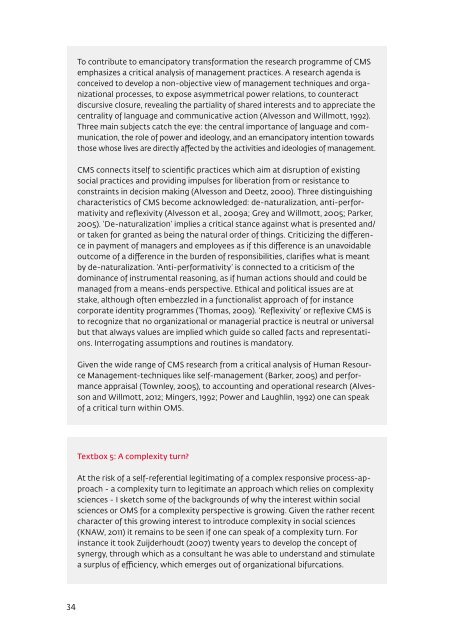Rumbling on performativity_Frits Simon
Rumbling on performativity_Frits Simon
Rumbling on performativity_Frits Simon
Create successful ePaper yourself
Turn your PDF publications into a flip-book with our unique Google optimized e-Paper software.
To c<strong>on</strong>tribute to emancipatory transformati<strong>on</strong> the research programme of CMS<br />
emphasizes a critical analysis of management practices. A research agenda is<br />
c<strong>on</strong>ceived to develop a n<strong>on</strong>-objective view of management techniques and organizati<strong>on</strong>al<br />
processes, to expose asymmetrical power relati<strong>on</strong>s, to counteract<br />
discursive closure, revealing the partiality of shared interests and to appreciate the<br />
centrality of language and communicative acti<strong>on</strong> (Alvess<strong>on</strong> and Willmott, 1992).<br />
Three main subjects catch the eye: the central importance of language and communicati<strong>on</strong>,<br />
the role of power and ideology, and an emancipatory intenti<strong>on</strong> towards<br />
those whose lives are directly affected by the activities and ideologies of management.<br />
CMS c<strong>on</strong>nects itself to scientific practices which aim at disrupti<strong>on</strong> of existing<br />
social practices and providing impulses for liberati<strong>on</strong> from or resistance to<br />
c<strong>on</strong>straints in decisi<strong>on</strong> making (Alvess<strong>on</strong> and Deetz, 2000). Three distinguishing<br />
characteristics of CMS become acknowledged: de-naturalizati<strong>on</strong>, anti-<strong>performativity</strong><br />
and reflexivity (Alvess<strong>on</strong> et al., 2009a; Grey and Willmott, 2005; Parker,<br />
2005). ‘De-naturalizati<strong>on</strong>’ implies a critical stance against what is presented and/<br />
or taken for granted as being the natural order of things. Criticizing the difference<br />
in payment of managers and employees as if this difference is an unavoidable<br />
outcome of a difference in the burden of resp<strong>on</strong>sibilities, clarifies what is meant<br />
by de-naturalizati<strong>on</strong>. ‘Anti-<strong>performativity</strong>’ is c<strong>on</strong>nected to a criticism of the<br />
dominance of instrumental reas<strong>on</strong>ing, as if human acti<strong>on</strong>s should and could be<br />
managed from a means-ends perspective. Ethical and political issues are at<br />
stake, although often embezzled in a functi<strong>on</strong>alist approach of for instance<br />
corporate identity programmes (Thomas, 2009). ‘Reflexivity’ or reflexive CMS is<br />
to recognize that no organizati<strong>on</strong>al or managerial practice is neutral or universal<br />
but that always values are implied which guide so called facts and representati<strong>on</strong>s.<br />
Interrogating assumpti<strong>on</strong>s and routines is mandatory.<br />
Given the wide range of CMS research from a critical analysis of Human Resource<br />
Management-techniques like self-management (Barker, 2005) and performance<br />
appraisal (Townley, 2005), to accounting and operati<strong>on</strong>al research (Alvess<strong>on</strong><br />
and Willmott, 2012; Mingers, 1992; Power and Laughlin, 1992) <strong>on</strong>e can speak<br />
of a critical turn within OMS.<br />
Textbox 5: A complexity turn?<br />
At the risk of a self-referential legitimating of a complex resp<strong>on</strong>sive process-approach<br />
- a complexity turn to legitimate an approach which relies <strong>on</strong> complexity<br />
sciences - I sketch some of the backgrounds of why the interest within social<br />
sciences or OMS for a complexity perspective is growing. Given the rather recent<br />
character of this growing interest to introduce complexity in social sciences<br />
(KNAW, 2011) it remains to be seen if <strong>on</strong>e can speak of a complexity turn. For<br />
instance it took Zuijderhoudt (2007) twenty years to develop the c<strong>on</strong>cept of<br />
synergy, through which as a c<strong>on</strong>sultant he was able to understand and stimulate<br />
a surplus of efficiency, which emerges out of organizati<strong>on</strong>al bifurcati<strong>on</strong>s.<br />
34



